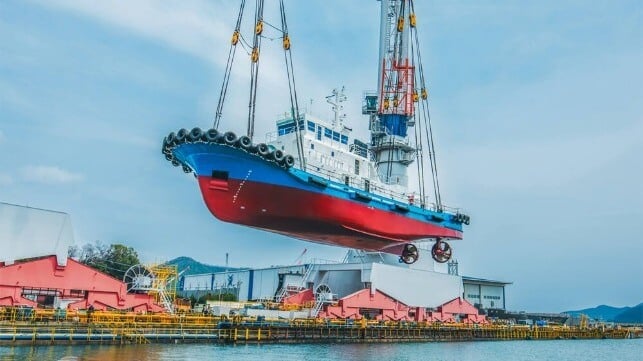Japan Launches First Hydrogen Dual-Fuel Tugboat as Part of Zero Emission Ships Project
Key Ideas
- Japan launched its first hydrogen dual-fuel tugboat as part of the Zero Emission Ships Project, using a high-power internal combustion engine for enhanced maneuverability and performance.
- The tugboat features twin 12-cylinder hydrogen-blended engines and a large-capacity high-pressure hydrogen gas storage system, aiming to reduce carbon dioxide emissions by approximately 60 percent.
- If the hydrogen fuel system fails, the vessel can operate with traditional marine fuels, ensuring safety. Additionally, Tsuneishi is incorporating green steel produced by JFE Steel Corporation for sustainability.
- While hydrogen fuel cell projects are ongoing, this initiative highlights Japan's advancement in utilizing hydrogen as a marine fuel, following projects like the Hydrotug 1 in the Port of Antwerp-Bruges led by CMB.TECH.
Japan recently launched its first hydrogen dual-fuel tugboat under the Zero Emission Ships Project sponsored by The Nippon Foundation. The vessel, built by Tsuneishi Shipbuilding, features a high-power output hydrogen dual-fuel internal combustion engine and a large-capacity high-pressure hydrogen gas storage system. With the ability to store 250kg of high-pressure hydrogen gas, it can deliver the same performance as traditional fuel while reducing carbon dioxide emissions by around 60 percent. In case of hydrogen fuel system failure, the tugboat can switch to conventional marine fuels, maintaining safety standards. Nishijima Takanori of Tsuneishi Shipbuilding expressed confidence in utilizing their expertise for future hydrogen-fueled vessels. The project also highlights the incorporation of green steel by JFE Steel Corporation for sustainability. This initiative signifies a step forward in Japan's efforts to leverage hydrogen as a marine fuel. Although hydrogen fuel cell projects are prevalent, the focus on high-power internal combustion engines showcases innovation in the sector. The article also mentions other hydrogen-fueled vessel projects like the Hydrotug 1 in the Port of Antwerp, emphasizing the global interest in hydrogen as a sustainable marine fuel.
Topics
Power
Technology
Innovation
Sustainability
Steel Production
Shipbuilding
Marine Industry
Emissions Reduction
Latest News
